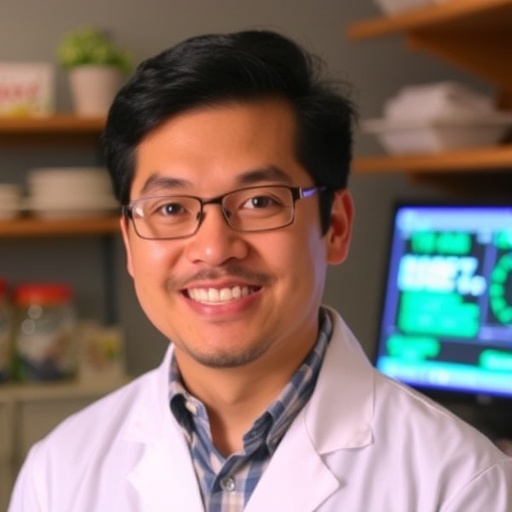In the ongoing quest for food safety, a significant breakthrough has emerged from the innovative research of Taeyeong Choi, an assistant professor of information technology at Kennesaw State University. His team is developing an advanced electronic nose, commonly referred to as an e-nose, with the aim to detect food spoilage more accurately and efficiently than existing methods. The traditional protocols for assessing food safety can be tedious and destructive, often leading to unnecessary food waste, which significantly contributes to the growing problem of food insecurity around the globe.
Current food safety routines typically rely on sensory cues—mainly the visual assessment of food items or olfactory detection through smell. However, these methods fall short when it comes to the invisible pathogens responsible for foodborne illnesses, such as salmonella and E. coli. These pathogens can lurk in food products, rendering them hazardous for human consumption without any outward signs that traditional senses can detect. As a response to this critical concern, Choi’s e-nose employs cutting-edge technology to analyze volatile organic compounds (VOCs) emitted by food, which may signal the presence of harmful bacteria.
The e-nose harnesses the capabilities of artificial intelligence and machine learning to identify and quantify these chemical signals. By training AI algorithms on extensive datasets consisting of various VOC samples, researchers can create a robust model capable of differentiation between contaminants and safe food, thus significantly enhancing the chances to avert foodborne illnesses before they reach the consumer’s plate. Choi’s innovation may ultimately change how we approach food safety, steering us toward a future where food testing is not only faster but also non-destructive.
Foodborne illnesses represent a pressing public health issue, with the Centers for Disease Control and Prevention (CDC) estimating that there are approximately 128,000 hospitalizations and around 3,000 deaths each year in the United States alone. This grim statistic emphasizes the critical need for rapid and accurate diagnostic tools that can assure the safety of the food supply. Moreover, Choi’s work aims to benefit not only food sanitation but also has implications that could extend into other fields, such as healthcare and security.
Choi is particularly focused on pathogens like salmonella and E. coli due to their prevalence and potential for causing widespread illness. The evolution of the e-nose will enable it, over time, to identify a broader spectrum of pathogens, potentially creating an all-in-one diagnostic tool for food safety. This multi-faceted function of the e-nose can redefine how industries that deal with food production and retail conduct their quality assurance processes.
Rapidly evaluating food safety without destructively sampling the product could also mean significant savings for manufacturers and retailers. By adopting e-nose technology, companies could mitigate food waste, which is increasingly becoming a focal point in efforts to promote sustainability. The economic benefits of such innovation resonate well beyond mere waste reduction; they could translate into lower costs for consumers, a crucial aspect in today’s economy deeply impacted by inflation and food prices.
Choi’s ongoing work on the e-nose has received funding from the U.S. National Science Foundation, highlighting the project’s potential national impact and recognition within scientific communities. The NSF’s support underlines the importance of innovation in food technology as a response to both health and environmental crises.
The underlying technology of the e-nose benefits from interdisciplinary collaboration, involving expertise from fields such as AI, environmental science, food technology, and public health. This multifaceted approach can yield a more holistic understanding of food safety issues, which are often complex and influenced by various factors—ranging from agricultural practices to distribution logistics.
Choi’s vision for the e-nose does not end with food safety. The technology has the potential to be adapted for healthcare applications, where it can analyze breath samples to detect a multitude of diseases. This capability could pave the way toward non-invasive diagnostic techniques that revolutionize how healthcare providers monitor and treat patients. Imagine a future where your doctor has a simple device that can assess your health within moments, detecting chronic illnesses or diseases just from a breath.
Furthermore, the security sector could benefit from similar VOC-sensing technologies, enabling rapid threat detection in various contexts, such as identifying hazardous substances or detecting explosives. In a world where safety is paramount, such advancements would represent significant strides in enhancing public safety measures across multiple domains.
As artificial intelligence continues to evolve and integrate into everyday life, its incorporation into food safety technologies not only showcases the possibilities of modern science but also reinforces the role of research in addressing pressing societal concerns. With the ongoing support from academic institutions and research organizations, pioneering projects like Choi’s e-nose are set to lead the frontline in ensuring a safer, healthier future for consumers everywhere.
The impactful research led by Taeyeong Choi resonates on multiple levels—addressing urgent public health concerns, contributing to economic sustainability, and paving the way for groundbreaking technological advancements. The e-nose project is a testament to the power of innovation in shaping not just scientific practices but daily lives, ensuring that the simplest human necessity – food – remains safe and accessible for all.
Subject of Research: Development of an electronic nose (e-nose) for detecting foodborne pathogens
Article Title: Kennesaw State University Innovates Food Safety with Electronic Nose Technology
News Publication Date: October 2023
Web References: Kennesaw State University
References: Centers for Disease Control and Prevention
Image Credits: Credit: Kennesaw State University
Keywords
Food safety, electronic nose, artificial intelligence, foodborne illnesses, volatile organic compounds, pathogens detection, machine learning, sustainable food practices, public health.




